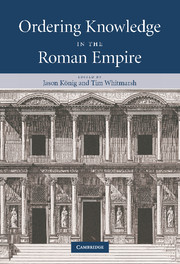Book contents
- Frontmatter
- Contents
- Preface
- Notes on contributors
- List of abbreviations
- Part I INTRODUCTION
- Part II KNOWLEDGE AND TEXTUAL ORDER
- Part III KNOWLEDGE AND SOCIAL ORDER
- 8 Knowledge and power in Frontinus' On aqueducts
- 9 Measures for an emperor: Volusius Maecianus' monetary pamphlet for Marcus Aurelius
- 10 Probing the entrails of the universe: astrology as bodily knowledge in Manilius' Astronomica
- 11 Galen's imperial order of knowledge
- Bibliography
- Index
10 - Probing the entrails of the universe: astrology as bodily knowledge in Manilius' Astronomica
Published online by Cambridge University Press: 28 August 2009
- Frontmatter
- Contents
- Preface
- Notes on contributors
- List of abbreviations
- Part I INTRODUCTION
- Part II KNOWLEDGE AND TEXTUAL ORDER
- Part III KNOWLEDGE AND SOCIAL ORDER
- 8 Knowledge and power in Frontinus' On aqueducts
- 9 Measures for an emperor: Volusius Maecianus' monetary pamphlet for Marcus Aurelius
- 10 Probing the entrails of the universe: astrology as bodily knowledge in Manilius' Astronomica
- 11 Galen's imperial order of knowledge
- Bibliography
- Index
Summary
The upsurge of interest in astrology during the early principate is well attested. Emperors have their horoscopes published. Zodiacal signs take their place on a range of objects, from public monuments to legionary standards. Elite authors advertise their familiarity with astrological lore. Belief in stellar influence thus coincides with – and to a certain extent parallels – the triumph of rationalisation in the realms of law, history and governance. While we cannot rule out an indigenous interest in stellar influence, astrology at Rome is best understood as one more intellectual discipline transported from the Greek East and systematised and legitimised as part of Rome's cultural revolution of the first centuries bce and ce.
The paradox that a discipline as seemingly irrational as astrology flourishes amidst the rationalising enterprises of its time invites investigation, all the more so since astrology seems to have had a special appeal for the cosmopolitan elite. The traditional explanation for astrology's ascent, which links it to the rise of dominant individuals, is vague and at best partial. Is it concern to identify potential victors in civil struggle that leads Romans to search the stars? If so, then we would expect widespread belief in stellar influence to precede interest in the horoscopes of a Sulla or Pompey – a proposition for which there is little evidence.
- Type
- Chapter
- Information
- Ordering Knowledge in the Roman Empire , pp. 229 - 240Publisher: Cambridge University PressPrint publication year: 2007
- 2
- Cited by

